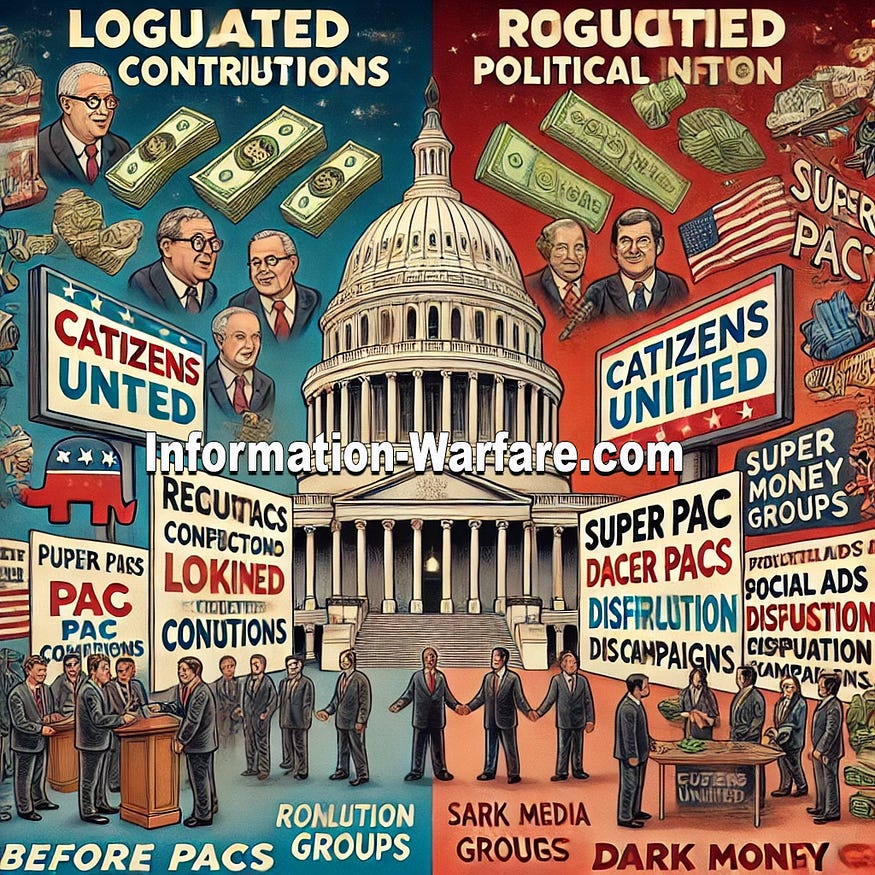The Architects of the Information War
How American Greed, Citizens United, MAGA Republicans, Putin, Russia, and the Ukraine Conflict Shape the Global Battle for Truth

The Information War Facilitators
How Citizens United, MAGA Republicans, Putin, Russia, and Ukraine Have Contributed to the Fall of American Democracy
In the digital age, the concept of information warfare has become a critical aspect of global politics. This multifaceted battle involves the strategic use of information and misinformation to influence public perception, destabilize adversaries, and shape geopolitical landscapes. Key players in this ongoing struggle include the Citizens United ruling, MAGA Republicans, Putin, Russia, and the Ukraine conflict.
Here’s how each of these elements contributes to the information war:
Citizens United: Unleashing Dark Money
The Supreme Court’s Citizens United v. FEC ruling in 2010 significantly altered the landscape of American politics by allowing unlimited corporate spending in elections. This decision has far-reaching implications for the information war:
Unlimited Political Spending: Corporations and wealthy individuals can funnel vast amounts of money into political campaigns, often through Super PACs and dark money groups. This influx of cash amplifies their ability to influence elections and policy decisions.
Propaganda and Disinformation: With more money at their disposal, interest groups can fund extensive propaganda and disinformation campaigns. These efforts aim to sway public opinion and shape the political narrative in favor of their interests.
Erosion of Public Trust: The increased influence of money in politics has led to growing public cynicism and distrust in democratic institutions. This erosion of trust is fertile ground for misinformation to take root and spread.
MAGA Republicans: Shaping the Narrative
The rise of the MAGA (Make America Great Again) movement under former President Donald Trump has had a profound impact on the information war:
Populist Messaging: MAGA Republicans use populist rhetoric to appeal to a broad base of supporters. This messaging often includes conspiracy theories, xenophobia, and distrust of traditional media.
Alternative Media Ecosystem: The movement has fostered an alternative media ecosystem, including outlets like Fox News, Breitbart, and numerous social media influencers. These platforms disseminate MAGA-aligned narratives, often blurring the lines between fact and opinion.
Polarization and Division: The aggressive and polarizing tactics of MAGA Republicans contribute to social division. By framing issues in stark, us-versus-them terms, they create an environment where misinformation can flourish.
Putin and Russia: Masterminds of Disinformation
Russian President Vladimir Putin has been a central figure in the global information war, leveraging state resources to conduct sophisticated disinformation campaigns:
State-Sponsored Troll Farms: Russia employs troll farms, such as the Internet Research Agency (IRA), to spread disinformation and sow discord on social media platforms. These operations target both domestic and international audiences.
Election Interference: Russian efforts to interfere in elections, including the 2016 U.S. presidential election, involve hacking, leaking information, and amplifying divisive content. These tactics aim to undermine confidence in democratic processes.
Propaganda Outlets: Russian state media, including RT (Russia Today) and Sputnik, disseminate propaganda that supports Kremlin narratives. These outlets often present biased or false information to shape public perception.
The Ukraine Conflict: A Hotbed of Misinformation
The ongoing conflict in Ukraine serves as a significant battleground in the information war, with both Russia and Ukraine engaging in propaganda efforts:
Russian Aggression: Russia uses disinformation to justify its actions in Ukraine, portraying the Ukrainian government as illegitimate and framing the conflict as a fight against fascism. This narrative is pushed through state media and social media campaigns.
Ukrainian Response: Ukraine counters with its own information campaigns, seeking to highlight Russian aggression and garner international support. Ukrainian efforts focus on documenting war crimes, rallying public opinion, and appealing to global audiences.
International Impact: The information war surrounding Ukraine affects global geopolitics, influencing the policies of NATO, the European Union, and other international bodies. Misinformation can sway public opinion and impact diplomatic decisions.
Conclusion
The interplay between Citizens United, MAGA Republicans, Putin, Russia, and the Ukraine conflict illustrates the complexity of the modern information war. Unlimited political spending enables widespread propaganda efforts, while populist movements and state-sponsored disinformation campaigns deepen societal divisions and erode trust in democratic institutions. Understanding these dynamics is crucial for developing strategies to counter misinformation and protect the integrity of democratic processes.
For more insights and detailed analysis, explore our articles on Information Warfare.

